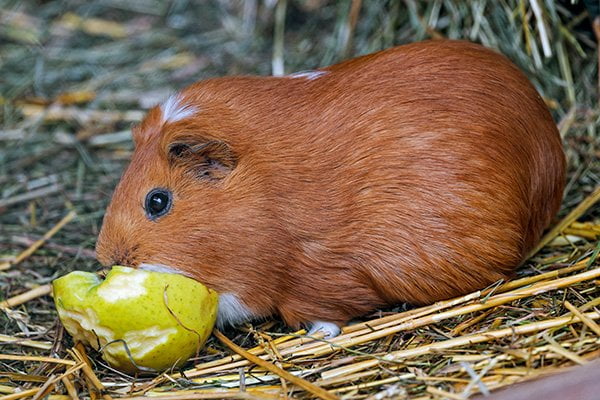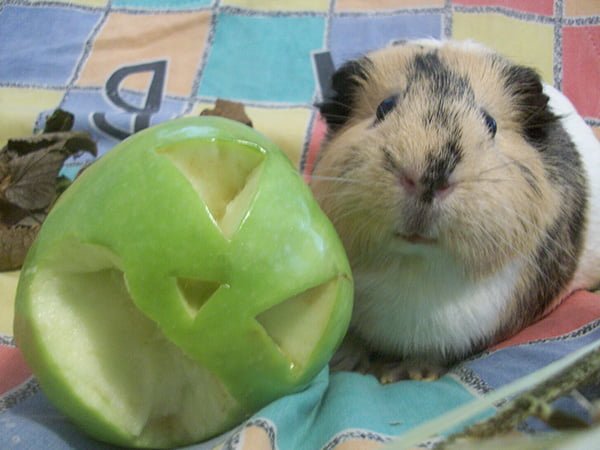As pet owners, it can be fun to supplement the typical pellet diet of your guinea pig with an array of fresh fruits and vegetables. They can offer added health benefits and bring joy to your pet! However, not every fruit or vegetable should be given to guinea pigs. Apples are a popular fruit that most people have on hand, so guinea pig owners may wonder - is it safe to feed guinea pigs apples? Are apples good for guinea pigs? What are the health benefits and risks of feeding guinea pigs apples?
Below, we'll tell you everything you need to know about whether guinea pigs should eat apples and how to serve them safely to your furry friend!
Can Guinea Pigs Eat Apples?
Yes, guinea pigs can eat apples! But they shouldn't eat them in abundance and must be prepared appropriately.
Health Benefits Of Apples
First, let's talk about why you might want to feed your guinea pigs apples in the first place. What nutritional benefits might an apple have for your pet?
Vitamins
Apples are a great source of Vitamin C, E, and many types of Vitamin B. These are essential for immune system function and protein metabolism. Guinea pigs, in particular, need a large amount of Vitamin C, and a deficiency of Vitamin C in guinea pigs can lead to scurvy.
Antioxidants
Apples contain an abundance of polyphenols, which is a key group of antioxidants. The job of antioxidants is to protect your cells from the free radicals that can lead to chronic health conditions.
Dietary Fiber
Apples are high in both water and dietary fiber, making them both hydrating and satiating. A guinea pig's natural diet needs large amounts of dietary fiber.

Source: Flickr
The Downside Of Guinea Pigs Eating Apples
It's important to give your guinea pig a healthy rotation of leafy greens, fresh fruits, and raw vegetables daily. However, it's equally important not just to offer one type of fruit or vegetable too frequently. A guinea pig's health will be negatively affected if they eat apples daily.
High Sugar Content
In the wild, a guinea pig's diet mostly consists of grass and hay. Fresh fruits contain considerably more sugar than either of these! It won't take many apples for a guinea pig to consume entirely too much sugar. Only feed apples to your guinea pig in moderation!
Toxic Seeds
Apple seeds contain a powerful poison known as cyanide. Eating too many apple seeds can pose a potential risk to a guinea pig. When feeding an apple to a guinea pig, apple seeds should be removed.
Acidity
Some apples are slightly acidic and can be harmful to guinea pigs. Avoid any sour-tasting apples and opt for sweet and plain-tasting red apples.
What Is The Best Way For Guinea Pigs To Eat Apples?
The most important part of feeding apples to your guinea pig is to be careful with the portion size and the frequency. Apples should not be given to your pet more than 2 or 3 times a week as the pet's main diet should be guinea pig pellets.
Guinea pigs generally love to eat apples, so you need to determine how much apple is appropriate for your guinea pig. Small guinea pigs should only have one apple slice at a time, and larger guinea pigs can enjoy two apple slices as a serving size. Guinea pigs love apples and readily overeat them, so it's up to you to ensure your guinea pig only eats an appropriate amount of apples!
Before giving a guinea pig apples, be sure to wash the apple thoroughly. Most apples found in the grocery store have a waxy coating on the peel that will need to be washed off using warm, soapy water. Rinse off the soapy water with white vinegar, then let the fruit dry. Even if you get your apple directly from an apple tree, it's best to wash it to remove any pesticide residue.
After cleaning the apple, cut it into thin, wedge-shaped sliced. Take care to remove any seeds!

Source: Flickr
Frequently Asked Questions
Can Guinea Pigs Eat Apple Skin?
Yes, it is safe for guinea pigs to eat apple skins or peels. Just be sure that the apple peel was thoroughly washed.
Can Guinea Pigs Eats Green Apples?
Guinea pigs can technically eat green apples, but they should avoid sour apples. Most green apples are sour, so it's a good rule of thumb to avoid giving green apples to your guinea pig. Sour apples contain acids that can cause significant irritation to your guinea pig's mouth.
Can Guinea Pigs Eat Apple Seeds?
No, guinea pigs can not eat apple seeds. This is because apple seeds contain small amounts of cyanide. In the small bodies of guinea pigs, it doesn't take many apple seeds before the cyanide accumulates.
Can Guinea Pigs Eat Apple Cores?
Yes, guinea pigs can eat an apple core, provided you have removed all of the seeds. However, since it's possible that you might miss one, it's best to avoid feeding apple cores to your guinea pig and stick to the juicy parts.
Can Baby Guinea Pigs Eat Apples?
Baby guinea pigs should only eat milk or formula until they are at least six weeks old. At that point, pelleted foods, fruits, and vegetables can be slowly introduced.
Can Guinea Pigs Drink Apple Juice?
Guinea pigs should not drink apple cider vinegar, apple juice, or apple cider. These all contain too much sugar and have high amounts of natural acid.
Can Guinea Pigs Eat Cooked Apples?
Guinea pigs should not be given cooked food of any sort to eat. When apples are cooked, sugar and other spices are often added, and these ingredients are completely unnecessary in a guinea pig's diet and can be harmful. Furthermore, cooked apples are so soft that they do nothing to help maintain your guinea pig's teeth.
What Happens If A Guinea Pig Eats Too Much Apple?
If a guinea pig eats too much apple, it can feel bloated and can have diarrhea. If your notice your pet becomes slightly sick, take away any remaining apple and replace it with its normal guinea pig pellets. Make sure there is plenty of clean and fresh drinking water.
If any issue persists, talk to your veterinarian as soon as possible.
